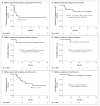Chimeric Antigen Receptor T Cells in Refractory B-Cell Lymphomas
- PMID: 29226764
- PMCID: PMC5788566
- DOI: 10.1056/NEJMoa1708566
Chimeric Antigen Receptor T Cells in Refractory B-Cell Lymphomas
Abstract
Background: Patients with diffuse large B-cell lymphoma or follicular lymphoma that is refractory to or that relapses after immunochemotherapy and transplantation have a poor prognosis. High response rates have been reported with the use of T cells modified by chimeric antigen receptor (CAR) that target CD19 in B-cell cancers, although data regarding B-cell lymphomas are limited.
Methods: We used autologous T cells that express a CD19-directed CAR (CTL019) to treat patients with diffuse large B-cell lymphoma or follicular lymphoma that had relapsed or was refractory to previous treatments. Patients were monitored for response to treatment, toxic effects, the expansion and persistence of CTL019 cells in vivo, and immune recovery.
Results: A total of 28 adult patients with lymphoma received CTL019 cells, and 18 of 28 had a response (64%; 95% confidence interval [CI], 44 to 81). Complete remission occurred in 6 of 14 patients with diffuse large B-cell lymphoma (43%; 95% CI, 18 to 71) and 10 of 14 patients with follicular lymphoma (71%; 95% CI, 42 to 92). CTL019 cells proliferated in vivo and were detectable in the blood and bone marrow of patients who had a response and patients who did not have a response. Sustained remissions were achieved, and at a median follow-up of 28.6 months, 86% of patients with diffuse large B-cell lymphoma who had a response (95% CI, 33 to 98) and 89% of patients with follicular lymphoma who had a response (95% CI, 43 to 98) had maintained the response. Severe cytokine-release syndrome occurred in 5 patients (18%). Serious encephalopathy occurred in 3 patients (11%); 2 cases were self-limiting and 1 case was fatal. All patients in complete remission by 6 months remained in remission at 7.7 to 37.9 months (median, 29.3 months) after induction, with a sustained reappearance of B cells in 8 of 16 patients and with improvement in levels of IgG in 4 of 10 patients and of IgM in 6 of 10 patients at 6 months or later and in levels of IgA in 3 of 10 patients at 18 months or later.
Conclusions: CTL019 cells can be effective in the treatment of relapsed or refractory diffuse large B-cell lymphoma and follicular lymphoma. High rates of durable remission were observed, with recovery of B cells and immunoglobulins in some patients. Transient encephalopathy developed in approximately one in three patients and severe cytokine-release syndrome developed in one in five patients. (Funded by Novartis and others; ClinicalTrials.gov number, NCT02030834 .).
Figures
Comment in
-
A Milestone for CAR T Cells.N Engl J Med. 2017 Dec 28;377(26):2593-2596. doi: 10.1056/NEJMe1714680. Epub 2017 Dec 10. N Engl J Med. 2017. PMID: 29226781 No abstract available.
-
Haematological cancer: Favourable outcomes with CAR T cells.Nat Rev Clin Oncol. 2018 Feb;15(2):65. doi: 10.1038/nrclinonc.2017.208. Epub 2018 Jan 3. Nat Rev Clin Oncol. 2018. PMID: 29297506 No abstract available.
References
-
- Feugier P, Van Hoof A, Sebban C, et al. Long-term results of the R-CHOP study in the treatment of elderly patients with diffuse large B-cell lymphoma: a study by the Groupe d’Etude des Lymphomes de l’Adulte. J Clin Oncol. 2005;23:4117–26. - PubMed
-
- Pfreundschuh M, Trümper L, Osterborg A, et al. CHOP-like chemotherapy plus rituximab versus CHOP-like chemotherapy alone in young patients with good-prognosis diffuse large-B-cell lymphoma: a randomised controlled trial by the MabThera International Trial (MInT) Group. Lancet Oncol. 2006;7:379–91. - PubMed
Publication types
MeSH terms
Substances
Associated data
Grants and funding
LinkOut - more resources
Full Text Sources
Other Literature Sources
Medical
Miscellaneous

